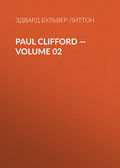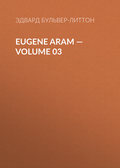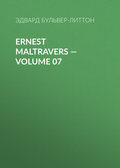
Эдвард Бульвер-Литтон
Falkland, Complete
E– was about twelve miles from a celebrated cliff on the seashore, and Lady Margaret had long proposed an excursion to a spot, curious alike for its natural scenery and the legends attached to it. A day was at length fixed for accomplishing this plan. Falkland was of the party. In searching for something in the pockets of the carriage, his hand met Emily’s, and involuntarily pressed it. She withdrew it hastily, but he felt it tremble. He did not dare to look up: that single contact had given him a new life: intoxicated with the most delicious sensations, he leaned back in silence. A fever had entered his veins—the thrill of the touch had gone like fire into his system—all his frame seemed one nerve.
Lady Margaret talked of the weather and the prospect, wondered how far they had got, and animadverted on the roads, till at last, like a child, she talked herself to rest. Mrs. Dalton read “Guy Mannering;” but neither Emily nor her lover had any occupation or thought in common with their companions: silent and absorbed, they were only alive to the vivid existence of the present. Constantly engaged, as we are, in looking behind us or before, if there be one hour in which we feel only the time being—in which we feel sensibly that we live, and that those moments of the present are full of the enjoyment, the rapture of existence—it is when we are with the one person whose life and spirits have become the great part and principle of our own. They reached their destination—a small inn close by the shore. They rested there a short time, and then strolled along the sands towards the cliff. Since Falkland had known Emily, her character was much altered. Six weeks before the time I write of, and in playfulness and lightness of spirits she was almost a child: now those indications of an unawakened heart had mellowed into a tenderness full of that melancholy so touching and holy, even amid the voluptuous softness which it breathes and inspires. But this day, whether from that coquetry so common to all women, or from some cause more natural to her, she seemed gayer than Falkland ever remembered to have seen her. She ran over the sands, picking up shells, and tempting the waves with her small and fairy feet, not daring to look at him, and yet speaking to him at times with a quick tone of levity which hurt and offended him, even though he knew the depth of those feelings she could not disguise either from him or from herself. By degrees his answers and remarks grew cold and sarcastic. Emily affected pique; and when it was discovered that the cliff was still nearly two miles off, she refused to proceed any farther. Lady Margaret talked her at last into consent, and they walked on as sullenly as an English party of pleasure possibly could do, till they were within three quarters of a mile of the place, when Emily declared she was so tired that she really could not go on. Falkland looked at her, perhaps, with no very amiable expression of countenance, when he perceived that she seemed really pale and fatigued; and when she caught his eyes, tears rushed into her own.
“Indeed, indeed, Mr. Falkland,” she said, eagerly, “this is not affectation. I am very tired; but rather than prevent your amusement, I will endeavour to go on.” “Nonsense, child,” said Lady Margaret, “you do seem tired. Mrs. Dalton and Falkland shall go to the rock, and I will stay here with you.” This proposition, however, Lady Emily (who knew Lady Margaret’s wish to see the rock) would not hear of; she insisted upon staying by herself. “Nobody will run away with me; and I can very easily amuse myself with picking up shells till you comeback.” After along remonstrance, which produced no effect, this plan was at last acceded to. With great reluctance Falkland set off with his two companions; but after the first step, he turned to look back. He caught her eye, and felt from that moment that their reconciliation was sealed. They arrived, at last, at the cliff. Its height, its excavations, the romantic interest which the traditions respecting it had inspired, fully repaid the two women for the fatigue of their walk. As for Falkland, he was unconscious of everything around him; he was full of “sweet and bitter thoughts.” In vain the man whom they found loitering there, in order to serve as a guide, kept dinning in his ear stories of the marvellous, and exclamations of the sublime. The first words which aroused him were these; “It’s lucky, please your Honour, that you have just saved the tide. It is but last week that three poor people were drowned in attempting to come here; as it is, you will have to go home round the cliff.” Falkland started: he felt his heart stand still. “Good God!” cried Lady Margaret, “what will become of Emily?”
They were—at that instant in one of the caverns, where they had already been loitering too long. Falkland rushed out to the sands. The tide was hurrying in with a deep sound, which came on his soul like a knell. He looked back towards the way they had come: not one hundred yards distant, and the waters had already covered the path! An eternity would scarcely atone for the horror of that moment! One great characteristic of Falkland was his presence of mind. He turned to the man who stood beside him—he gave him a cool and exact description of the spot where he had left Emily. He told him to repair with all possible speed to his home—to launch his boat—to row it to the place he had described. “Be quick,” he added, “and you must be in time: if you are, you shall never know poverty again.” The next moment he was already several yards from the spot. He ran, or rather flew, till he was stopped by the waters. He rushed in; they were over a hollow between two rocks—they were already up to his chest. “There is yet hope,” thought he, when he had passed the spot, and saw the smooth sand before him. For some minutes he was scarcely sensible of existence; and then he found himself breathless at her feet. Beyond, towards T– (the small inn I spoke of), the waves had already reached the foot of the rocks, and precluded all hope of return. Their only chance was the possibility that the waters had not yet rendered impassable the hollow through which Falkland had just waded. He scarcely spoke; at least he was totally unconscious of what he said. He hurried her on breathless and trembling, with the sound of the booming waters ringing in his ear, and their billows advancing to his very feet. They arrived at the hollow: a single glance sufficed to show him that their solitary hope was past! The waters, before up to his chest, had swelled considerably: he could not swim. He saw in that instant that they were girt with a hastening and terrible death. Can it be believed that with that certainty ceased his fear? He looked in the pale but calm countenance of her who clung to him, and a strange tranquillity, even mingled with joy, possessed him. Her breath was on his cheek—her form was reclining on his own—his hand clasped hers; if they were to die, it was thus. What would life afford to him more dear? “It is in this moment,” said he, and he knelt as he spoke, “that I dare tell you what otherwise my lips never should have revealed. I love—I adore you! Turn not away from me thus. In life our persons were severed; if our hearts are united in death, then death will be sweet.” She turned—her cheek was no longer pale! He rose—he clasped her to his bosom: his lips pressed hers. Oh! that long, deep, burning pressure!—youth, love, life, soul, all concentrated in that one kiss! Yet the same cause which occasioned the avowal hallowed also the madness of his heart. What had the passion, declared only at the approach of death, with the more earthly desires of life? They looked to heaven—it was calm and unclouded: the evening lay there in its balm and perfume, and the air was less agitated than their sighs. They turned towards the beautiful sea which was to be their grave: the wild birds flew over it exultingly: the far vessels seemed “rejoicing to run their course.” All was full of the breath, the glory, the life of nature; and in how many minutes was all to be as nothing! Their existence would resemble the ships that have gone down at sea in the very smile of the element that destroyed them. They looked into each other’s eyes, and they drew still nearer together. Their hearts, in safety apart, mingled in peril and became one. Minutes rolled on, and the great waves came dashing round them. They stood on the loftiest eminence they could reach. The spray broke over their feet: the billows rose—rose—they were speechless. He thought he heard her heart beat, but her lip trembled not. A speck—a boat! “Look up, Emily! look up! See how it cuts the waters. Nearer—nearer! but a little longer, and we are safe. It is but a few yards off;—it approaches—it touches the rock!” Ah! what to them henceforth was the value of life, when the moment of discovering its charm became also the date of its misfortunes, and when the death they had escaped was the only method of cementing their—union without consummating their guilt?
FROM ERASMUS FALKLAND, ESQ., TO THE HON. FREDERICK MONKTON
I will write to you at length to-morrow. Events have occurred to alter, perhaps, the whole complexion of the future. I am now going to Emily to propose to her to fly. We are not les gens du monde, who are ruined by the loss of public opinion. She has felt that I can be to her far more than the world; and as for me, what would I not forfeit for one touch of her hand?
EXTRACTS FROM THE JOURNAL OF LADY EMILY MANDEVILLE
Friday.—Since I wrote yesterday in these pages the narrative of our escape, I have done nothing but think over those moments, too dangerous because too dear; but at last I have steeled my heart—I have yielded to my own weakness too long—I shudder at the abyss from which I have escaped. I can yet fly. He will come here to-day—he shall receive my farewell.
Saturday morning, four o’clock.—I have sat in this room alone since eleven o’clock. I cannot give vent to my feelings; they seem as if crushed by some load from which it is impossible to rise. “He is gone, and for ever!” I sit repeating those words to myself, scarcely conscious of their meaning. Alas! when to-morrow comes, and the next day, and the next, and yet I see him not, I shall awaken, indeed, to all the agony of my loss! He came here—he saw me alone—he implored me to fly. I did not dare to meet his eyes; I hardened my heart against his voice. I knew the part I was to take—I have adopted it; but what struggles, what misery, has it not occasioned me! Who could have thought it had been so hard to be virtuous! His eloquence drove me from one defence to another, and then I had none but his mercy. I opened my heart—I showed him its weakness—I implored his forbearance. My tears, my anguish, convinced him of my sincerity. We have parted in bitterness, but, thank Heaven, not in guilt! He has entreated permission to write to me. How could I refuse him? Yet I may not—cannot-write to him again! How could, I indeed, suffer my heart to pour forth one of its feelings in reply? for would there be one word of regret, or one term of endearment, which my inmost soul would not echo?
Sunday.—Yes, that day—but I must not think of this; my very religion I dare not indulge. Oh God! how wretched I am! His visit was always the great aera in the clay; it employed all my hopes till he came, and all my memory when he was gone. I sit now and look at the place he used to fill, till I feel the tears rolling silently down my cheek: they come without an effort—they depart without relief.
Monday.—Henry asked me where Mr. Falkland was gone; I stooped down to hide my confusion. When shall I hear from him? To-morrow? Oh that it were come! I have placed the clock before me, and I actually count the minutes. He left a book here; it is a volume of “Melmoth.” I have read over every word of it, and whenever I have come to a pencil-mark by him, I have paused to dream over that varying and eloquent countenance, the low soft tone of that tender voice, till the book has fallen from my hands, and I have started to find the utterness of my desolation!
FROM ERASMUS FALKLAND, ESQ., TO LADY EMILY MANDEVILLE
—– Hotel, London.
For the first time in my life I write to you! How my hand trembles—how my cheek flushes! a thousand, thousand thoughts rush upon me, and almost suffocate me with the variety and confusion of the emotions they awaken! I am agitated alike with the rapture of writing to you, and with the impossibility of expressing the feelings which I cannot distinctly unravel even to myself. You love me, Emily, and yet I have fled from you, and at your command; but the thought that, though absent, I am not forgotten, supports me through all.
It was with a feverish sense of weariness and pain that I found myself entering this vast reservoir of human vices. I became at once sensible of the sterility of that polluted soil so incapable of nurturing affection, and I clasped your image the closer to my heart. It is you, who, when I was most weary of existence, gifted me with a new life. You breathed into me a part of your own spirit; my soul feels that influence, and becomes more sacred. I have shut myself from the idlers who would molest me: I have built a temple in my heart: I have set within it a divinity; and the vanities of the world shall not profane the spot which has been consecrated to you. Our parting, Emily,—do you recall it? Your hand clasped in mine; your cheek resting, though but for an instant, on my bosom; and the tears which love called forth, but which virtue purified even at their source. Never were hearts so near, yet so divided; never was there an hour so tender, yet so unaccompanied with danger. Passion, grief, madness, all sank beneath your voice, and lay hushed like a deep sea within my soul! “Tu abbia veduto il leone ammansarsi alla sola tua voce.”
‘Ultime lettere di Jacopo Ortis.
I tore myself from you; I hurried through the wood; I stood by the lake, on whose banks I had so often wandered with you: I bared my breast to the winds; I bathed my temples with the waters. Fool that I was! the fever, the fever was within! But it is not thus, my adored and beautiful friend, that I should console and support you. Even as I write, passion melts into tenderness, and pours itself in softness over your remembrance. The virtue so gentle, yet so strong; the feelings so kind, yet so holy; the tears which wept over the decision your lips proclaimed—these are the recollections which come over me like dew. Let your own heart, my Emily, be your reward; and know that your lover only forgets that he adores, to remember that he respects you.
FROM THE SAME TO THE SAME
—– Park.
I could not bear the tumult and noise of London. I sighed for solitude, that I might muse over your remembrance undisturbed. I came here yesterday. It is the home of my childhood. I am surrounded on all sides by the scenes and images consecrated by the fresh recollections of my unsullied years. They are not changed. The seasons which come and depart renew in them the havoc which they make. If the December destroys, the April revives; but man has but one spring, and the desolation of the heart but one winter! In this very room have I sat and brooded over dreams and hopes which—but no matter—those dreams could never show me a vision to equal you, or those hopes hold out to me a blessing so precious as your love.
Do you remember, or rather can you ever forget, that moment in which the great depths of our souls were revealed? Ah! not in the scene in which such vows should have been whispered to your ear and your tenderness have blushed its reply. The passion concealed in darkness was revealed in danger; and the love, which in life was forbidden, was our comfort amidst the terrors of death! And that long and holy kiss, the first, the only moment in which our lips shared the union of our souls!—do not tell me that it is wrong to recall it!—do not tell me that I sin, when I own to you the hours I sit alone, and nurse the delirium of that voluptuous remembrance. The feelings you have excited may render me wretched, but not guilty; for the love of you can only hallow the heart—it is a fire which consecrates the altar on which it burns. I feel, even from the hour that I loved, that my soul has become more pure. I could not believe that I was capable of so unearthly an affection, or that the love of woman could possess that divinity of virtue which I worship in yours. The world is no fosterer of our young visions of purity and passion: embarked in its pursuits, and acquainted with its pleasures, while the latter sated me with what is evil, the former made me incredulous to what is pure. I considered your sex as a problem which my experience had already solved. Like the French philosophers, who lose truth by endeavouring to condense it, and who forfeit the moral from their regard to the maxim, I concentrated my knowledge of women into aphorism and antitheses; and I did not dream of the exceptions, if I did not find myself deceived in the general conclusion. I confess that I erred; I renounce from this moment the colder reflections of my manhood,—the fruits of a bitter experience,—the wisdom of an inquiring yet agitated life. I return with transport to my earliest visions of beauty and love; and I dedicate them upon the altar of my soul to you, who have embodied, and concentrated, and breathed them into life!
EXTRACTS FROM THE JOURNAL OF LADY EMILY MANDEVILLE
Monday.—This is the most joyless day in the whole week; for it can bring me no letter from him. I rise listlessly, and read over again and again the last letter I received from him—useless task! it is graven on my heart! I long only for the day to be over, because to-morrow I may, perhaps, hear from him again. When I wake at night from my disturbed and broken sleep, I look if the morning is near; not because it gives light and life, but because it may bring tidings of him. When his letter is brought to me, I keep it for minutes unopened—I feed my eyes on the handwriting—I examine the seal—I press it with my kisses, before I indulge myself in the luxury of reading it. I then place it in my bosom, and take it thence only to read it again and again,—to moisten it with my tears of gratitude and love, and, alas! of penitence and remorse! What can be the end of this affection? I dare neither to hope that it may continue or that it may cease; in either case I am wretched for ever!
Monday night, twelve o’clock.—They observe my paleness; the tears which tremble in my eyes; the listlessness and dejection of my manner. I think Mrs. Dalton guesses the cause. Humbled and debased in my own mind, I fly, Falkland, for refuge to you! Your affection cannot raise me to my former state, but it can reconcile—no—not reconcile, but support me in my present. This dear letter, I kiss it again—oh! that to-morrow were come!
Tuesday.—Another letter, so kind, so tender, so encouraging: would that I deserved his praises! alas! I sin even in reading them. I know that I ought to struggle more against my feelings—once I attempted it; I prayed to Heaven to support me; I put away from me everything that could recall him to my mind—for three days I would not open his letters. I could then resist no longer; and my weakness became the more confirmed from the feebleness of the struggle. I remember one day that he told us of a beautiful passage in one of the ancients, in which the bitterest curse against the wicked is, that they may see virtue, but not be able to obtain it; [Persius]—that punishment is mine!
Wednesday.—My boy has been with me: I see him now from the windows gathering the field-flowers, and running after every butterfly which comes across him. Formerly he made all my delight and occupation; now he is even dearer to me than ever; but he no longer engrosses all my thoughts. I turn over the leaves of this journal; once it noted down the little occurrences of the day; it marks nothing now but the monotony of sadness. He is not here—he cannot come. What event then could I notice?







